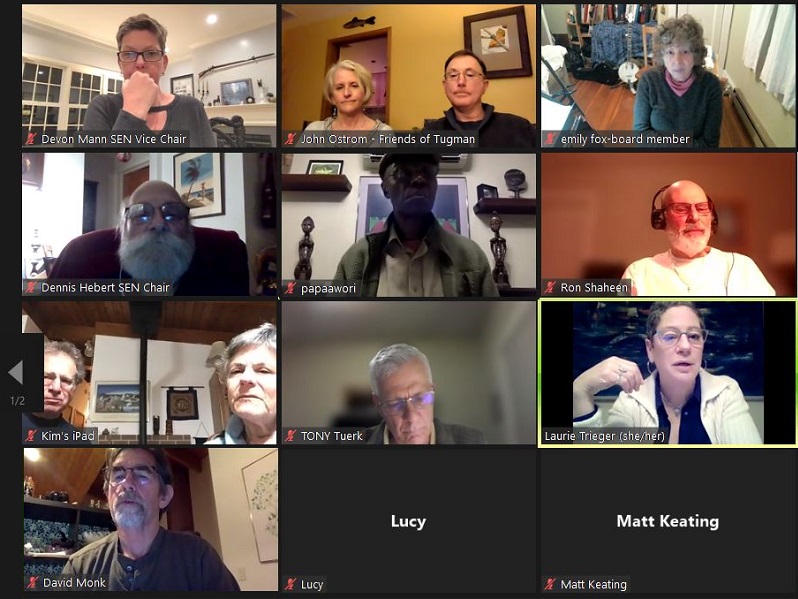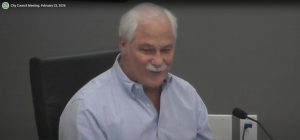Commissioner Trieger updates South Eugene
7 min read
Lane County Commissioner Laurie Trieger addressed the SEN General Meeting on March 8, 2022.
What is Lane County doing in South Eugene these days?
[00:00:04] Commissioner Laurie Trieger: I would say the two things are, one is the 30th Avenue corridor redesign, where particularly our transportation team is looking at that to improve safety. It’s a high-traffic, high-speed corridor, and we want to do everything we can to keep folks safe in their cars, but also make it safer and more accommodating for bicycle and pedestrian access.
[00:00:27] And then the other is the wildland-urban interface and issues around fire, fire protection, fire prevention, and fire safety and planning. If we saw something like the Holiday Farm Fire that we saw at the McKenzie Valley in the South Hills of Eugene, we would have a really equally and even more so devastating experience in terms of loss of life than we had up the McKenzie because of how densely populated and how difficult and how few the escape routes are. So that’s something that I’m really keenly aware of and in communication with our staff about.
[00:00:59] John Q: What’s the latest on the fairgrounds?
[00:01:01] Commissioner Laurie Trieger: We are in the midst of long-range planning for that 55-acre, publicly-owned property. And as many of you probably know the Ems (Eugene Emeralds), for a number of reasons, need a new home. And they approached us as part of that planning process to see if we couldn’t enter into a public private partnership and build a new multipurpose stadium where the Ems would be sort of the anchor tenant so we’d have some guaranteed income and it would also give us an opportunity to improve that asset, the Lane Event Center and the fairgrounds property. So that’s being costed out and staff is working on identifying possible funding streams and what that looks like. There’s a page on our website with lots of more information. That hasn’t yet come to the board for a final say-so. The board simply directed staff to do the feasibility research and costing and so on, on that.
[00:01:51] John Q: She was asked about Lane County’s climate actions.
[00:01:54] Commissioner Laurie Trieger: We started our climate action plan first with our own internal operations and an energy audit and looking at ways we could reduce our own emissions with our internal operations at Lane County.
[00:02:08] And we have a ton of opportunity for reducing emissions at Lane County through decarbonisation around, like, concrete and asphalt for all of our county roads that we pave our county; capital projects, buildings that we construct and so on. We are working on a process to convert the county vehicle fleet to electric vehicles, and the pandemic had us make a big shift to a lot of positions telecommuting, which has really positive climate impacts. As you know, we manage the landfill and the landfill is the single greatest producer of methane gas when it comes to the county’s own operations. And we have some really brilliant, dedicated folks and I think there’ll be some really exciting projects in the next couple of years to significantly reduce methane gas production from the land at the landfill.
[00:02:57] The next phase of our audits and climate action planning, we’ll be looking outward from the organization to community level changes that we can support, or be part of. The Climate Action Plan is nearly finished. We saw a draft of it as a board, and we assigned a staff a few more weeks to make some modifications to it based on some public comment and feedback that we got. And that will be coming back to us in April for final adoption, the county’s first ever climate action plan.
[00:03:26] John Q: The other big topic was homelessness.
[00:03:28] Commissioner Laurie Trieger: One of the greatest challenges for us at Lane County is the basic human needs that we exist to meet and the infrastructure needs. And we take care of humans and humans are expensive and we’re worth it. But we have a real revenue problem. So we’re heading into budget season and every year it’s a real challenge.
[00:03:46] So I can explain our fundamental role around housing and homelessness as a county government. We are the Continuum of Care. So we are the local government entity that receives the federal, the HUD housing and urban development dollars to the local community. And so there is the Poverty and Homelessness board, which sort of sets the strategic direction for the human services work in lane county, and then the Human Services Commission, which looks at the allocation of some of those dollars around housing and homelessness projects in Lane County.
[00:04:17] This year’s application for the Continuum of Care, I think is a $4.3 million application. And a lot of that includes then payment out to sub-recipients and subcontractors who deliver the services. In addition to the services that we do directly, as I mentioned before, for instance, around behavioral health and direct health care, we also do a lot of work around permanent supportive housing, which is meeting the highest needs folks transitioning from homelessness into housing, with wraparound services to support them.
[00:04:49] And of course, Lane County has received over $100 million of ARPA monies. And we have spent a little over $20.5 million are allocated on housing, including rental assistance, utility weatherization, and water assistance, permanent supportive housing services.
[00:05:08] We have a half-million-dollar BIPOC home ownership seed fund. We are acquiring land to build services permanent supportive housing on, we have granted money out to Square One Villages for their Peace Village project. St. Vincent de Paul’s veterans housing project gets half a million of that among others. That’s housing.
[00:05:29] Homelessness specifically, we are on track to open our shelter and navigation center at 100 River Avenue this summer. And that is a partnership with Lane County and the City of Eugene and many others. We have given money to pretty much any organization that you know of that’s delivering services, whether it’s St Vincent De Paul or Carry It Forward, and the City of Eugene for their rest stops, we have contracts with these organizations to deliver services. And we also have folks on staff doing direct street outreach and navigation and support for unhoused and unsheltered folks.
[00:06:02] And then $5.5 million in aid to nonprofits to help them build capacity and it creates the support services that they are offering out to neighbors.
[00:06:12] And again, our services are all over Lane County. So we have the little pallet shelter structures in Oakridge and Florence and Junction City. And of course in Eugene and Springfield as well.
[00:06:23] John Q: Any update on the Lane County courthouse?
[00:06:26] Commissioner Laurie Trieger: Yeah, so the county and the city had a land swap. So the city block between seventh, eighth, Pearl and high that’s a parking lot now was tagged to be the site of a new county courthouse, a justice center, because it is not just a matter of, we need some nicer offices. It really is a matter of safety. Judges’ chambers, jury assembly rooms, prisoners and our public safety staff are all way too close together. Victims and the folks who are on trial are in close proximity. So on that side, it’s rough.
[00:06:59] The building is also a money pit for us to maintain. But the short answer is we are not currently in the queue, right? There’s federal and state match dollars for new courthouses. And every pretty much every county in the state is vying for them. And so we’re just, we’re not in the queue, this cycle, we’re not in a position. We put a bond measure out to the public and they said, no, that’s not what they want to spend money on right now. So that project is going to be at least a few more years before we revisit building a new county courthouse.
[00:07:29] John Q: She addressed a question about the Historical Society Museum moving into the old Oregon Electric Station.
[00:07:35] Commissioner Laurie Trieger: That required some land swap and property swaps that just didn’t pencil out for the county, the building as beautiful as it was and as great as it would be to see the historical museum there, the cost to retrofit it for seismic, alter/able access and roofing and HVAC, and all the things was just cost-prohibitive. And the person who owns that property made a proposal for a land swap with some county property that really just didn’t pencil out for us. We’ve directed our staff to work with the Historical Society to help find them a good and right new home and preserve the collection.
[00:08:07] John Q: How can people get involved with Lane County?
[00:08:10] Commissioner Laurie Trieger: We have lots and lots of boards and commissions, if you want to get involved in parks advisory, climate action homelessness work, mental health advisory, there’s a page on the county website that lists them and those openings do come up and we’d love to have folks apply.
[00:08:26] John Q: Commissioner Trieger gives an update to South Eugene.




